(捷进英语2)Unit8-电子教案
- 格式:doc
- 大小:61.50 KB
- 文档页数:5
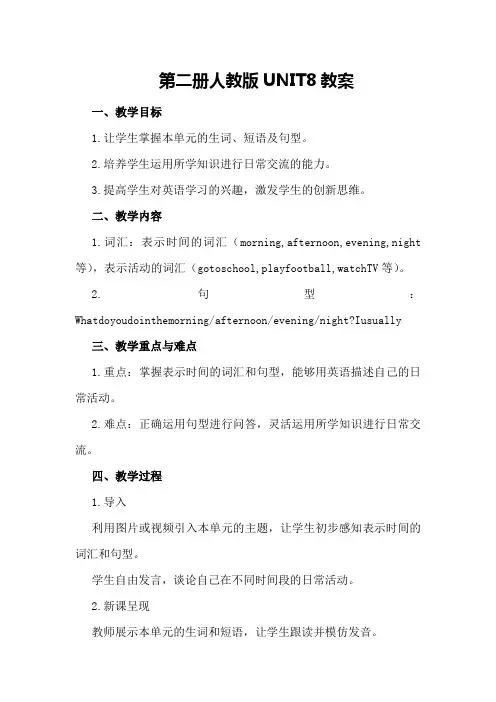
第二册人教版UNIT8教案一、教学目标1.让学生掌握本单元的生词、短语及句型。
2.培养学生运用所学知识进行日常交流的能力。
3.提高学生对英语学习的兴趣,激发学生的创新思维。
二、教学内容1.词汇:表示时间的词汇(morning,afternoon,evening,night 等),表示活动的词汇(gotoschool,playfootball,watchTV等)。
2.句型:Whatdoyoudointhemorning/afternoon/evening/night?Iusually三、教学重点与难点1.重点:掌握表示时间的词汇和句型,能够用英语描述自己的日常活动。
2.难点:正确运用句型进行问答,灵活运用所学知识进行日常交流。
四、教学过程1.导入利用图片或视频引入本单元的主题,让学生初步感知表示时间的词汇和句型。
学生自由发言,谈论自己在不同时间段的日常活动。
2.新课呈现教师展示本单元的生词和短语,让学生跟读并模仿发音。
教师引导学生学习句型,让学生在情境中练习问答。
3.课堂活动情境对话:教师设置不同场景,让学生用所学句型进行对话。
小组讨论:学生分组,讨论自己在不同时间段的日常活动,并用英语表达。
角色扮演:学生扮演不同角色,用英语描述自己的日常生活。
4.练习巩固完成课本练习题,巩固所学知识。
教师设计一些拓展练习,让学生在实际语境中运用所学知识。
5.课堂小结学生分享自己在课堂活动中的收获和感悟。
6.作业布置完成课本课后练习题。
用英语写一篇关于自己日常活动的短文。
五、教学反思六、教学延伸1.课后让学生收集表示时间的英文歌曲或故事,下节课分享给全班同学。
2.组织一次以“我的日常生活”为主题的英语角活动,让学生用英语介绍自己的日常生活。
3.鼓励学生参加英语演讲比赛,提高自己的英语表达能力。
重难点补充:1.重点:通过图片、实物或多媒体辅助教学,让学生直观地理解表示时间的词汇。
利用生活化场景,让学生在实际语境中练习使用句型Whatdoyoudointhemorning/afternoon/evening/night?和Iusually。
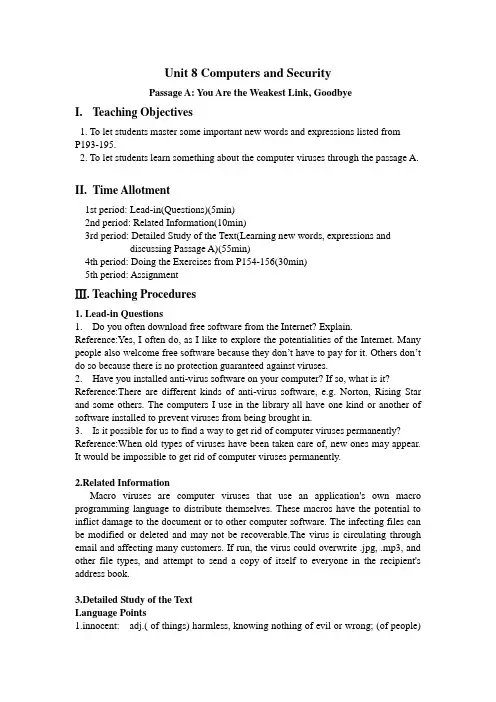
Unit 8 Computers and SecurityPassage A: You Are the Weakest Link, GoodbyeI.Teaching Objectives1. To let students master some important new words and expressions listed fromP193-195.2. To let students learn something about the computer viruses through the passage A.II.Time Allotment1st period: Lead-in(Questions)(5min)2nd period: Related Information(10min)3rd period: Detailed Study of the Text(Learning new words, expressions and discussing Passage A)(55min)4th period: Doing the Exercises from P154-156(30min)5th period: AssignmentⅢ. Teaching Procedures1. Lead-in Questions1.Do you often download free software from the Internet? Explain.Reference:Yes, I often do, as I like to explore the potentialities of the Internet. Many people also welcome free software because they don’t have to pay for it. Others don’t do so because there is no protection guaranteed against viruses.2. Have you installed anti-virus software on your computer? If so, what is it? Reference:There are different kinds of anti-virus software, e.g. Norton, Rising Star and some others. The computers I use in the library all have one kind or another of software installed to prevent viruses from being brought in.3. Is it possible for us to find a way to get rid of computer viruses permanently? Reference:When old types of viruses have been taken care of, new ones may appear. It would be impossible to get rid of computer viruses permanently.2.Related InformationMacro viruses are computer viruses that use an application's own macro programming language to distribute themselves. These macros have the potential to inflict damage to the document or to other computer software. The infecting files can be modified or deleted and may not be recoverable.The virus is circulating through email and affecting many customers. If run, the virus could overwrite .jpg, .mp3, and other file types, and attempt to send a copy of itself to everyone in the recipient's address book.3.Detailed Study of the TextLanguage Points1.innocent: adj.( of things) harmless, knowing nothing of evil or wrong; (of people)guiltlessExamples:Don’t be so innocent as to believe everything you see.Is she guilty or innocent of the crime?2. or so: aboutExamples:She will be back in a day or so.In another year or so, Lucy will have forgotten all about him.3.encounter v.1) meet or be faced by (something bad, especially a danger or a difficulty) Examples:The plane encountered a storm over the Rockies.They encountered little resistance to the plan.2) meet unexpectedlyExamples:He encountered many interesting people on his travels.They came sneaking round the corner and encountered a policeman.4. unusual: adj. not common; rareExamples:It’s unusual to find diamonds of this size.Earlier this century, it was unusual for women to have a career.5. infect: vt.1) fill with disease, germs; give disease to (a person);2) If your excitement, eagerness etc. other people, it makes them begin to feel the same way.Examples:You can only be infected with with HIV in a limited number of ways.Lucy’s enthusiasm soon infected the rest of the class.6. transmit: vt. send or pass from one person, place or thing to another. Examples:The US Open will be transmitted via satellite.Do you know that an infection may be transmitted by mosquitoes?7. clean up: clean thoroughlyExamples:We spent all Saturday morning cleaning up.Let me just go and clean myself up.8. in place: in the right or proper placeExamples:Have you got all the lights in place yet?cf. out of placeExamples: I felt completely out of place among all those smart rich people.9. ensure: vt. make (something certain) to happenExamples:All necessary steps have been taken to ensure their safety.His husband ensured that he took all his pills every day.10. adequate: adj. enough for the purposeExamples:Without the proper resources the department cannot do an adequate job.Are the parking facilities adequate for fifty cars?11.detect: vt. find out; noticeExamples:Many forms of cancer can be cured if detected early.Do I detect a note of sarcasm in your voice?adj. Detectable12. update: vt. make more modern or up-to-dateExamples:We need to update the defensive weaponry.The files need updating.13. considerable: adj. fairly large or great in amount, size, or degreeExamples:He has been ill for a considerable time.The sun was now high in the sky, and the heat very considerable.14. identify: vt. prove or show who or what somebody is or something is Examples:The light was too dim for me to identify her.I identify myself first.They were reluctant to identify themselves fully with any particular side.15. inflict: vt. give (a blow, etc); cause to sufferExamples:They won’t let any foreign power inflict any further blows on their national pride.Our army is inflicting heavy losses on the enemy.16. set in: begin and (probably) continueExamples:Luckily the wound was treated before infection could set in.He must try and get my garden tidied up before the bad weather sets in. 17. recede: vt. (of thing) move back or awayExamples:The coast receded as we sailed away.The plane gradually receded out of sigh18. at risk: in dangerExamples:The disease is spreading, and all children under 5 are at risk.The economy will fall further, putting more jobs at risk.19. more often than not: in most casesExamples:On weekends, more often than not, you’d find my uncle at work.More often than not the patient recovers.21.odd adj.1) not regular, habitual, or fixed; occasional2) strange; unusualExamples:He had some odd change in his pocket.It is odd that I can’t remember Mary’s address.22. as a matter of course: as a regular habit or usual procedureExamples:I check my e-mail every morning as a matter of course.Notes to the Text1.It wasn’t unusual to find hundreds of commuters within one company infected by viruses transmitted via email attachments.As often the case that in the same company hundreds of computers would have viruses if the employees had opened email attachments containing these viruses.2. Companies now realize that viruses aren’t “urban myths” and ca n have a serious impact on their operations.Companies now understand that viruses are not modern made-up stories, and they can do great harm to a company’s operations.3. With the rapid transmission of files through networks and the Internet, a virus can spread a considerable distance before it can be identified and protected against.With the fast spread of information through networked computers and the Internet, a virus can reach many computers before anything can be done about it.4. Complacency can se t in when there is no perceived “action” on the virus front and no global crisis and the importance of being vigilant about viruses recedes in your users’ minds.People may ignore viruses and stop worrying about them when no major worldwide viruses have been reported recently, and the need to be very on guard against viruses if easily forgotten6. Virus writers and hackers often use such software as the ideal “kick-start” for their virus distribution.Virus writers and people who break into other people’s c omputer files often use such software as the best means to get their viruses to start spreading.SummaryThe weakest link in the protection of a company's computers against viruses is the individual computer user. There is a strong tendency that the employees assume it is the company's computer security experts' job to worry about the viruses and they can bring the problem under control. But everyone must do their share to prevent viruses. Any unsolicited email attachment or any untested type of software may contain a virus.Even the best anti-virus software is not always effective and must be frequently updated. Constant education of all employees about viruses is the key tovirus prevention. No one should ever be allowed to relax their defenses, even if this means the company must have some rules set that employees might not like.4.Doing the Exercises(omitted)Ⅳ.AssignmentAsk students to read the passage and the new words again, try to recite the new words and the translations on P156.。
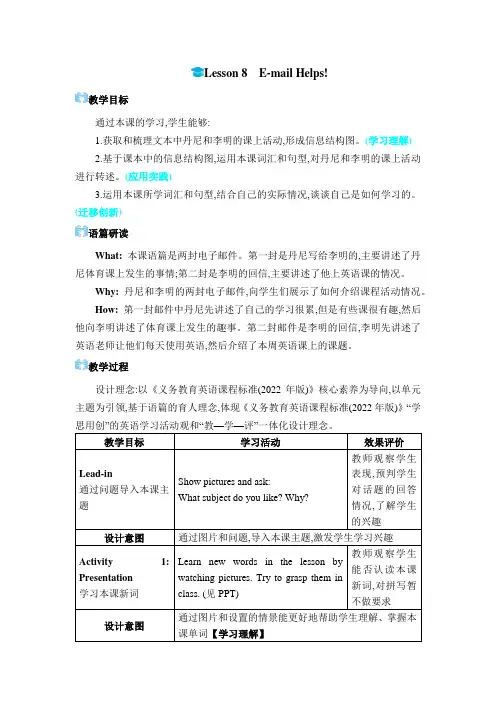
Lesson 8E-mail Helps!教学目标通过本课的学习,学生能够:1.获取和梳理文本中丹尼和李明的课上活动,形成信息结构图。
(学习理解)2.基于课本中的信息结构图,运用本课词汇和句型,对丹尼和李明的课上活动进行转述。
(应用实践)3.运用本课所学词汇和句型,结合自己的实际情况,谈谈自己是如何学习的。
(迁移创新)语篇研读What:本课语篇是两封电子邮件。
第一封是丹尼写给李明的,主要讲述了丹尼体育课上发生的事情;第二封是李明的回信,主要讲述了他上英语课的情况。
Why:丹尼和李明的两封电子邮件,向学生们展示了如何介绍课程活动情况。
How:第一封邮件中丹尼先讲述了自己的学习很累,但是有些课很有趣,然后他向李明讲述了体育课上发生的趣事。
第二封邮件是李明的回信,李明先讲述了英语老师让他们每天使用英语,然后介绍了本周英语课上的课题。
教学过程设计理念:以《义务教育英语课程标准(2022年版)》核心素养为导向,以单元主题为引领,基于语篇的育人理念,体现《义务教育英语课程标准(2022年版)》“学Activity 6:Practice对动词过去分词进行归类Finish Exercise 3 on page 21.(见PPT)的完成情况,并根据实际情况给出指导设计意图通过练习,进一步熟悉动词过去分词的变化规律,巩固对语法的掌握【应用实践】Activity 7: Languagepoints and summary 通过知识点的学习,解决后续学习中的问题1.all of的用法2.make sb. do sth.的用法3.“It’s+名词/形容词+to do sth.”的用法教师观察学生是否能够理解、掌握重要知识点,并能够区分易混词设计意图语言点的学习有助于学生应对答题过程中遇到的困难,对学生学习外语有十分重要的意义【学习理解】Activity 8:Practice 完成句子1.你不能让他站那么久。
You can’t him solong.2.这是放松的最好的方式。
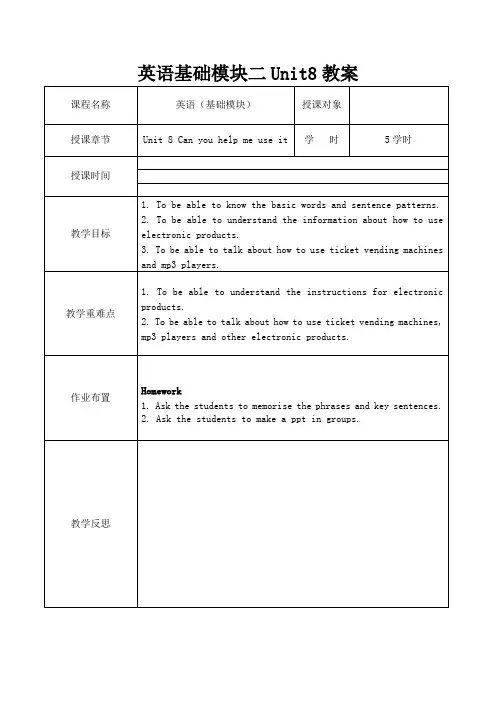

英语基础模块2 u n i t8导学案英语基础模块2UNIT 8导学案Unit 8 If you want to talk, you can go online.一、教学目标1、语言知识目标1)学生能够理解并运用本单元所学的有关网络的词汇和短语,并且掌握谈论上网话题所需的问答句型。
2)学生能够熟练运用条件和让步状语从句。
2、语言技能目标听——学生能够听懂有关上网话题的简单对话。
说——学生能够运用所学的句型简单谈论有关上网的话题。
读——学生能够读懂网上的帖子,并了解帖子的格式。
写——学生能够通过阅读和讨论,书写网上回帖。
3、文化意识学生能够了解网络文化,以及互联网对我们的生活所产生的影响。
4、情感态度学生能够通过对网络的了解,培养自我控制能力,正确对待网络和学习的关系。
二、教学重点、难点1)教学重点(1)食物类、衣物类、文具类词汇;(2)购物相关句型和用语。
2)教学难点阅读简单收据和支票,根据要求获取相关信息,并能根据要求填写收据和支票。
三、教学知识点1、电脑相关词汇:computer 电脑 laptop 笔记本 bandwidth 宽带,通讯频带 bluetooth 蓝牙browser 浏览器 double click 双击 drag 拖动 window 窗口 upgrade 升级hardware 硬件 software 软件 mouse 鼠标 preview 预览2、上网相关词汇:username 用户名 password 密码 home page 主页log-in/ sign-in 登入 log-out/ sign-out 注销 upload 上传 download 下载3、网络相关知识:WWW: world wide web 全球网(万维网)web 网络 website 网站 web page 网页 webmaster 网站管理员net-surfing 上网漫游 internet addiction 上网成瘾 netizen 网民hacker 黑客 virus 病毒 anti-virus software 杀毒软件IP 国际互联网协议“@”是一个符号,电邮应用中意义为“at”,即“某用户”在“某服务器”。

教师学科教案[ 20 – 20 学年度第__学期]任教学科:_____________任教年级:_____________任教老师:_____________xx市实验学校Module 2 Wonderful thingsUnit 8 Pets教案一、教学目标1、重点单词: weigh, talk, noise2、重点短语: put…in the sun, pick them up with your hands, once a day, grow up to be…, weigh up to…, make some noise, a talk on…3、重点句子: How do you look after your pets?二、教学重点能听懂录音内容,并能从听力材料中找出金鱼的具体特征。
三、教学难点学会询问最喜爱的动物并能用英语谈论他们最喜欢的宠物。
四、教学过程Step1:Lead-inWhich is your favorite pet? Can you tell me why?I like my________ because ___________.Would you like to have a goldfish as your pet?Step2: Discussion:How to look after a fantail goldfish?1. Can you put a goldfish in the sun?2. Is a goldfish heavy?3. Does a goldfish weigh several kilograms?4. Does it need clean water?5. Can you pick them up with your hands?6. Does it need special fish food?7. Is it difficult to look after a goldfish?8. Is a goldfish very expensive?Step3:Listen and finish Part A1 on Page 99.Read and finish Part A2 on Page 99.Read again and finish Part A3 on Page 100.Step4:Listen and answer:How do they look after their pets?Step5:Act out the dialogue1.学生跟录音朗读。
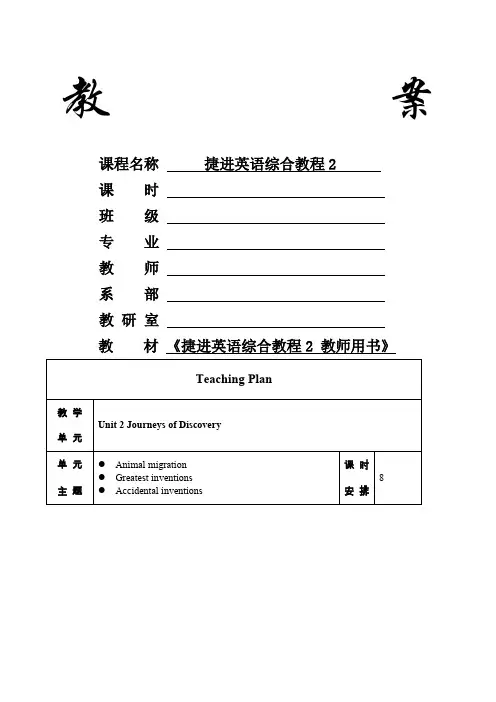
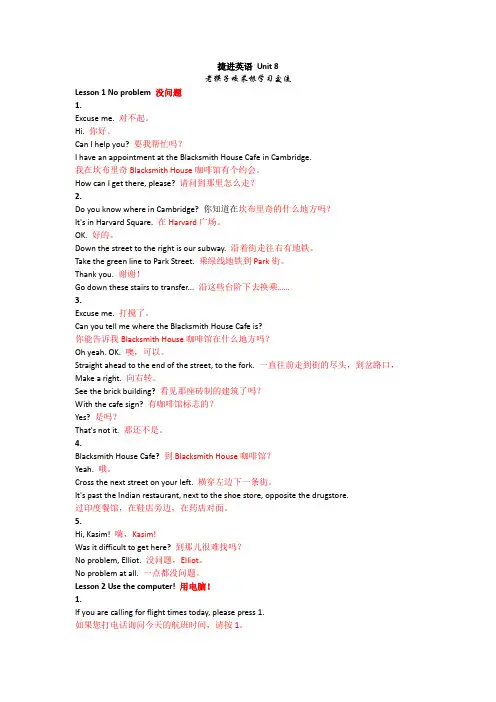
捷进英语Unit 8老猴子咬菜根学习交流Lesson 1 No problem 没问题1.Excuse me. 对不起。
Hi. 你好。
Can I help you? 要我帮忙吗?I have an appointment at the Blacksmith House Cafe in Cambridge.我在坎布里奇Blacksmith House咖啡馆有个约会。
How can I get there, please? 请问到那里怎么走?2.Do you know where in Cambridge? 你知道在坎布里奇的什么地方吗?It's in Harvard Square. 在Harvard广场。
OK. 好的。
Down the street to the right is our subway. 沿着街走往右有地铁。
Take the green line to Park Street. 乘绿线地铁到Park街。
Thank you. 谢谢!Go down these stairs to transfer... 沿这些台阶下去换乘……3.Excuse me. 打搅了。
Can you tell me where the Blacksmith House Cafe is?你能告诉我Blacksmith House咖啡馆在什么地方吗?Oh yeah. OK. 噢,可以。
Straight ahead to the end of the street, to the fork. 一直往前走到街的尽头,到岔路口,Make a right. 向右转。
See the brick building? 看见那座砖制的建筑了吗?With the cafe sign? 有咖啡馆标志的?Yes? 是吗?That's not it. 那还不是。
4.Blacksmith House Cafe? 到Blacksmith House咖啡馆?Yeah. 哦。
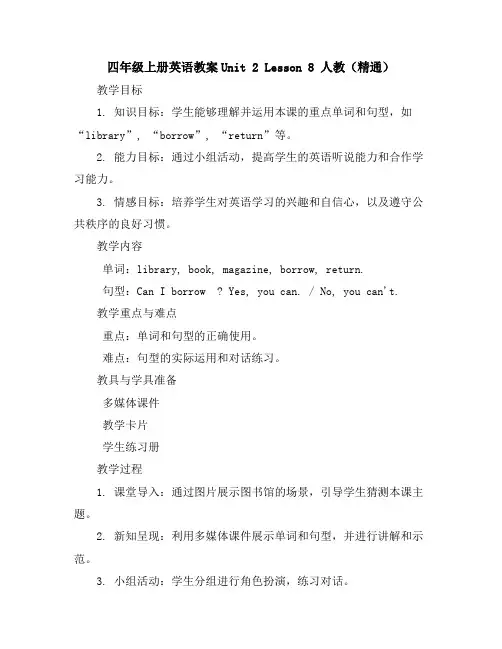
四年级上册英语教案Unit 2 Lesson 8 人教(精通)教学目标1. 知识目标:学生能够理解并运用本课的重点单词和句型,如“library”, “borrow”, “return”等。
2. 能力目标:通过小组活动,提高学生的英语听说能力和合作学习能力。
3. 情感目标:培养学生对英语学习的兴趣和自信心,以及遵守公共秩序的良好习惯。
教学内容单词:library, book, magazine, borrow, return.句型:Can I borrow ? Yes, you can. / No, you can't.教学重点与难点重点:单词和句型的正确使用。
难点:句型的实际运用和对话练习。
教具与学具准备多媒体课件教学卡片学生练习册教学过程1. 课堂导入:通过图片展示图书馆的场景,引导学生猜测本课主题。
2. 新知呈现:利用多媒体课件展示单词和句型,并进行讲解和示范。
3. 小组活动:学生分组进行角色扮演,练习对话。
4. 巩固练习:通过游戏和练习册上的习题巩固新知。
板书设计中心:图书馆的图片周边分布:重点单词和句型作业设计书面作业:完成练习册上的相关习题。
口头作业:与家长进行对话练习,描述在图书馆的经历。
课后反思反思学生对新知识的掌握程度,特别是句型的实际运用能力。
调整教学方法,以更好地适应学生的学习需求。
本教案遵循了教学目标、教学内容、教学重点与难点、教具与学具准备、教学过程、板书设计、作业设计、课后反思的结构,内容丰富、用词严谨,段落衔接流畅,共2000字以内。
教学过程详细说明1. 课堂导入:利用多媒体展示图书馆的图片,激发学生的好奇心和兴趣。
提问学生:“What do you think this place is?” “What can you do in a library?”通过学生的回答,自然引入本课主题。
2. 新知呈现:使用多媒体课件展示单词和句型,确保学生能够清晰地看到和听到。

英语基础模块第二册U n i t8教案-CAL-FENGHAI-(2020YEAR-YICAI)_JINGBIAN英语基础模块二Unit8教案Now, press…Step 2 Listening & Speaking practice (2)Jill: Hi, Jack. Would you show me how to use this MP3 player? Jack: Sure. First press the On button to start it. Then press the Play button, and it will play the song.Jill: What shall I do if I want to listen to the next song?Jack: Just press the Next button.Jill: How can I turn the volume down?Jack: Here is the Volume Down button. Just press it.Jill: Well, it’s easy. Thank you.Jack: You’re welcome.Listen again and fill.Step3:Reading Practice (1)Suitable for:Oily hairFunctions:Remove dust and eliminate itching. For those who are troubled by hair loss.Directions:Wet hair. Apply right amount of shampoo onto hair and rub into foam. Rinse well. Can be used every day.Warnings:For external use only. Not to be swallowed. Avoid contact with eyes. For adult use only. 1. Ask the students to look at the picture on Page 78, and predict what will be talked about in the dialogue.2. Play the tape in Activity ④, and ask the students to learn about the different functions of the buttons.3. Play the tape again, and ask the students to write1. Ask the students to read theinstruction for shampoo andunderline the new words.2. Present the tips briefly.3. Play the tape. Ask the students to read after the tape.4. Play the tape again, and then ask the students to fill in the form in Activity ②.5. Ask the students to read the new words and phrases.6. Ask the students to try to introduce their own shampoo.1. Ask the students to read the passage, and explain the new。
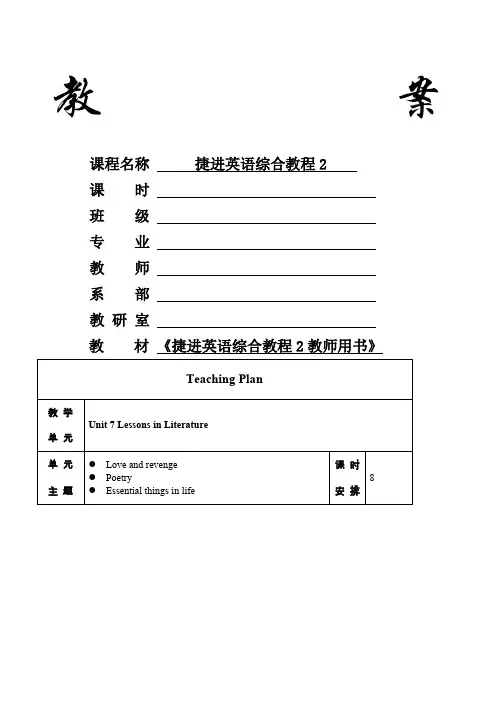
Unit8 Pets Study skill教案Teaching aims:Learn about the Internet, and use the Internet look for informationMake students use search engine to look for information by key words. Focus of the lesson and predicted area of difficulty:What’s the Internet?How to use the search engine?How to find out the right key words?Teaching procedures:Step 1 Lead-in1.为学生创造情境:I’m so sorry. My cat doesn’t eat anything for days. I want to know what’s wrong with it. Who can I turn to for information? Can you give me some advice?2.引导学生回答:You can get information from the Internet.Step 2 What is the Internet?an international computer networkConnect computer networks all over the worldGet different kinds of information from itMillions of websites on the InternetUse search engines to find the information you needStep 3 Two things to help us find information on the InternetSearch engine: help us find information quickly and easily(e.g. Google)Key words: type in a key word and the search engine will give you a list of relevant websites to look atStep4 Steps of finding information on the InternetStep1: open the search engineStep2: type in the right key wordsStep5 Have a tryDo you want to know something about the Olympic games, have a try! Step6 Pair workfind out the key words:(1) Millie wants to find information about the films in the 1960s (films;1960s)(2) Simon wants to find information about the history of football. (history; football)(3)Kitty wants to find information about Thanksgiving Day. (Thanksgiving Day)Step7 Different search engines:Google, Baidu, yahoo, youdao, soso, sohu, sina…Step8 Summarize: the key to searching。
四年级上册英语教学设计-Unit 2 Lesson 8 人教(精通)教学背景本次教学对象是四年级学生,本次课程的教学内容是英语Unit 2 Lesson 8。
这是一节关于时间的课程,旨在通过教学设计帮助学生掌握和应用问时间的基础询问句型。
教学目标本次教学的教学目标主要有以下方面:•能听懂和使用基础时间问句。
•能流利地回答一些时间问题。
•能熟练地应用所学时间词汇。
教学准备为了保证教学效果,本次教学需要一些相关准备。
•PPT幻灯片,为教学内容的展示提供支持。
•画有时钟的标准白板,作为帮助学生更好地学习时间的工具。
教学内容及流程Step 1 导入先播放英文歌唱爱你。
(爱课程录音室4年级英语必修素材)插入歌单:•爱你,不是因为你是一个怎样的人,而是因为我喜欢与你在一起时的感觉。
•学生自翻翻英文歌词以了解歌曲意义。
教师介绍课程教学主题并讲解事先准备的PPT,让学生快速进入上课状态,并了解所学知识的重点与难点。
Step 2 学习时间词汇老师介绍一些基本的时间词汇,如hour,minute,second等。
同时为学生带来一堆小饰物,让他们自由选择所喜欢的饰物来表达他们所选的时间(使用学习时间词汇)。
Step 3 学习基本的时间问句从PPT中介绍基本的时间问句。
并让学生逐一学习和模仿基本的时间问句结构。
Step 4 句型问答练习请学生相互之间进行问答练习,以强化其用基本时间问句的熟练和流利。
每个学生都需要回答老师所问的时间问题,并充分了解所学问题的应用场景。
Step 5 辅助练习与实际应用通过上课已经认识到的时钟图案来辅助学生应用所学概念,让学生深入理解所学知识,强化其对时间的极度熟悉程度。
Step 6 总结通过问答模式,老师通过课件整合所有所学内容,帮助学生回顾课程重点和难点,并鼓励学生在课后继续融合所学语言知识,增强其语言运用的能力。
课后作业•学生对所学内容进行复习整理;•梳理所学单词和表达,为下一课的教育做出准备。
英语牛津教材2B-Unit8教案课题:unit 8 time let’s learn 第 1 课时课型:n教学目标basic aim: to learn the new words: watch clock day nightdeveloping aim: make some sentences with the new words教学重点、难点、关键pronounce words properly课序教学过程设计设计意图warming-upsong创设气氛daily talkask and answer(tp)1. what do you see?2. what do you want?3. what do you hear?4. what can you do?5. what do you like to do?巩固旧句型并培育同学的听说力量new learning1. to teach: watch(1). ask a pupil: have you a watch?(2). point to the watch and say:look! i have a watch. it’s on my wrist.(3). say after the teacher: watch(4). make some sentences with “watch”e.g. i have a watch. this is my watch.由提问式引入引起同学留意并运用所学句型造句,使新词消化巩固。
2. to teach : clock(1). show a clock and ask the pupilst: is this a watch?p: no, it isn’t.t: what’s this?(2). point to the clock and sayt: this isn’t a watch. it’s a clock.(3). say after the teacher: clock(4). make some sentences with “clock”.e.g. listen to the clock. look at the clock. 由师生问答式关心同学理解新词含义并用旧句型将新词活用。
Unit 2 Lesson 8 全课时教案教学内容:冀教版小学英语4A Lesson 8教学目标:1. 知识方面:通过本课的学习,学生应掌握(说、认识和口头运用)下列词汇TV telephone computer radio;要求学生练习并能认识下列词汇watch TV/talk on the telephone/play on the computer/listen to the radio2. 能力方面:1)能把所学单词运用到日常口语交流当中,在适当的情境中能灵活运用。
如:在家看电视、打电话等等。
2)培养良好的生活习惯,不能过晚睡觉,要养成早睡早起的良好习惯。
3)情感、态度、价值观:通过创设情景发掘学生学习兴趣,通过角色扮演来调动学生的积极参与性。
教学重点、难点:重点:掌握及运用TV telephone computer radio难点:运用TV telephone computer radio教学准备:英语课本练习册字母卡片录音带及相关实物教学过程:Part 1:开始上课和复习问候T: Hello, everyone!S: Hello, Miss Lian!T: How are you, today?S: I’m fine, thanks.T: What do you do in the evening?S: I do my homework.T: Ok, fine.Part 2:新概念1. TV telephone computer radio播放录音,让学生看书跟读。
并与学生一起读TV telephone 同是指着教科书上的图画,还可以向学生提出诸如此类的问题:Do you have a TV at home?Do you like TV?What else do you recognize in the photographs?操练使用词汇卡片,操练TV telephone computer和radio《练习册》第一题:让学生画线连接图片和单词。
2019-2020年四年级英语上册 Unit2 Lesson 8教案人教新版1、热身/复习(Warm-up/Revision)(1)播放Number Song,让学生在欢快的歌曲中进一步熟悉数字。
(2)复习字母和单词。
先任意朗读26个英语字母,再出示数字卡片,认读英文数字和拼写单词。
然后挑出单词three,four 中含有的小写字母t,h,r,e,f,o,u任意朗读,为学习新单词做铺垫。
2、新课导入(Presentation)(1)让学生数一数挑出的单词three,four里面含有多少字母,巩固已学内容。
(2)教师用挑出的字母卡片拼出单词three,four,让学生在自己动手操作中学会组单词,增强学习兴趣。
学生在操练时,教师应注意指导学生three的读音。
(3)教师板书单词。
注意指导学生英文小写字母f和汉语拼音f的书写区别和占格的不同。
教师可以让有能力的学生用这几个字母拼出更多的单词。
(4)学习thirteen和fourteen。
教师摆出10粒糖果,要学生用英语数,数对的给奖一粒(额外的)。
教师又拿出4粒糖果,学生数后将两堆合在一起,问学生:现在一共有多少粒(教师要悄悄地迅速拿走一粒)?学生回答有14粒,这时告诉学生14的英语说法:fourteen.教师说:Sorry.You’re wrong.学生不信。
叫学生和自己一块数:one,two…thirteen.There are only thirteen candies.这个小戏法可激起学生兴趣,加深对数字thirteen和fourteen印象。
教师注意指导thirteen的读音及介绍两数词词缀的特点。
(5) 教师按照学生花名册点名numbers l—14,再问其中的一名学生:What’s your number?学生答: I'm number…同桌学生互相问答。
通过真实的情景问答,巩固数字,引出会话重心——数字1—14。
(6)向学生出示教学挂图,教师介绍长跑比赛的场景,按照运动员的编号,安排跑道,最后按编号统计运动员到达终点时的先后顺序。